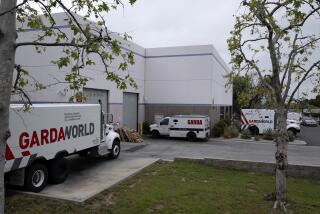Security Vault Firms Have Lock on Business Secrets
- Share via
For the oil companies that pay to store them, the sacks of mud lining the shelves in one of Bell & Howell’s secure vaults are worth their weight in black gold.
The core samples, taken from test wells drilled in countries that later turned unfriendly to the United States, are kept in storage should those fields ever be reopened to U.S. oil firms, according to James R. Buch, president of Bell & Howell’s Los Angeles-based Records Storage Management Division. The division operates 31 storage centers (including two in San Diego County) in 13 U.S. cities.
In addition to drilling cores, Bell & Howell’s centers store vast quantities of paper retrieved from waste baskets of tellers at banks and savings and loans. Fearful that tellers may have mistakenly tossed out important records, banks regularly keep individually tagged trash bags on-site for several days before shipping them to off-site centers, where they are stored for as long as six months, Buch said.
Not surprisingly, information storage company officials are tight-lipped about what items are stored in their vaults. Although Atlanta-based Fort Knox Secured Data founder Emory Morsberger revealed that his company stores the “secret formula” for a major soft-drink company, he refused to identify the company as Atlanta-based Coca-Cola.
Information storage company officials often are just as cautious about where material is stored. Although Buch readily described the oil field borings stored by Bell & Howell, he declined to say which facilities store them.
The use of off-site storage centers for both mundane and important corporate documents and items is likely to mushroom as more corporations realize that safe storage and handling of important data has become an important part of doing business.
Skokie, Ill.-based Bell & Howell (which bolstered its storage division in January with the acquisition of Los Angeles-based Bekins Records Management) now stores 10 billion paper, microfiche and computer-generated documents--including 4 million cubic feet of computer tape--at the company’s 31 storage facilities in 13 cities across the country.
The business of storing and handling electronically generated data alone has grown to more than $200 million a year, according to Morsberger, who predicted that the industry will grow to between $300 million and $500 million by 1990.
$1 Billion Yearly
Those figures increase to between $750 million and $1 billion per year when paper, microfilm, microfiche and computer-generated data are included, said Buch, who estimated that as many as 300 companies are pressing for corporate America’s storage business.
Although most corporate storage still involves paper documents, corporations are increasingly turning to off-site centers to store important and sensitive computer-generated data, Buch said.
“Companies are realizing the importance of setting up a third-party controlled system,” Morsberger said. “That realization comes from learning that 80% of (computer data) damage comes from inside the operation.”
Morsberger described a company that had its entire computer library destroyed by a frustrated computer tape librarian who evidently gained her vengeance after receiving two weeks’ notice that she was being fired for incompetence. Although the woman was prosecuted, she escaped punishment by using the “incompetence” charge as a defense, Morsberger said.
In another case, a company comptroller embezzled $400,000 and subsequently doctored the company’s financial records in order to hide his tracks and avoid prosecution.
“We polygraph our people before hiring them and repeat the polygraph each year,” Morsberger said. “And each of our people is bonded for $1 million.”
Corporations searching for that kind of security have helped secure-storage companies grow at a 30% to 45% annual rate, according to Carl Hanlon, executive director of the Raleigh, N.C.-based National Assn. of Private Security Vaults. Although the association initially served as an accrediting body for vaults that stored gold, jewels, gun collections and other private property, its members’ revenues have increasingly been generated by corporate clients.
That national trend has been mirrored in San Diego, according to Donald Sloane, founder and president of The Vault, a 3,000-square-foot secure facility in Mission Valley that was opened in 1982 to store personal belongings.
Today, 85% of The Vault’s storage space is dedicated to computer-generated records, Sloane said.
To ensure that secure facilities meet corporate clients’ needs, Hanlon’s staff has been developing an accreditation program that rates everything from how long it would take a thief to torch his way into a vault to systems that eliminate dust and pollutants, control humidity and temperature, and use halon gas to extinguish fires without damaging computer tapes.
That accreditation program has become necessary because of rapid growth in the market, said Hanlon, who compared industry growth to the early 1980s when “every Tom, Dick and Harry entered the private security vault market . . . (and) there was an incredible mortality rate.”
“In this kind of a business, you’ve got to be able to put in some heavy dollars before you’ll get profitable,” said Hanlon.
“You have to put a lot of money in the ground to do it right,” Sloane agreed. “This isn’t a get-rich scheme.”
Reasons for Storage
Although Sloane acknowledged that headlines about terrorism and natural disasters prompt managers to use off-site storage, he maintained that “80% of a company’s problems are people-related, not the airplane crashes, fires or floods but the inadvertent action of an employee who does something wrong and destroys (information).”
Buch also credited increased litigation for generating the industry’s growth.
“You can bet that every record, blueprint and change order for the building you’re sitting in will be retained by the architect and general contractor until the last stone is torn down,” Buch said. “If the fifth-floor window pops out (they’ll want) every piece of paper available to show that negligence was not a factor.
“And attorneys, realizing that you can store a carton of documents for a quarter a month, will advise them to keep the carton.”
Specialized Services
Storage facilities also provide specialized service for industries with particular needs.
One Bell & Howell film storage facility houses the master copies of George Lucas’ “Star Wars” films while another contains the originals of the “Ozzie & Harriet” television series.
The films are stored in different locations for security reasons--but also because color and black and white films require different temperature and humidity treatment, Buch said.
Bell & Howell also has provided high-security rooms for individuals.
“We had an entire room dedicated to the storage of John Lennon’s business records, as well as his artifacts and mementos--things like platinum records and marketing things,” Buch said.
In addition to providing safe storage, off-site locations can cut a corporation’s document storage costs in half because “we understand what kind of space is best suited for off-site storage and we have less expensive space than a corporation.”
Booming corporate interest in the document storage and handling industry has prompted a wave of consolidations, said Sloan, who has been “approached by a couple of groups with a facility or two elsewhere in the country.”
However, no company has gained a national presence, according to Buch, who added that even Bell & Howell has yet to open a facility in Boston, Philadelphia, Denver, Detroit or Seattle.
Fort Knox, which operates in eight cities, hopes to open facilities in Philadelphia, New York, Detroit and St. Louis, said Morsberger, who believes that only companies with a national service base--and the capital to keep pace with the industry’s rapidly changing technological advances--will survive.
In January, Fort Knox acquired its first West Coast location when it purchased The Treasury, a 3,000-square-foot secure facility that San Diego-based Home Federal Savings & Loan opened in 1981.
More to Read
Inside the business of entertainment
The Wide Shot brings you news, analysis and insights on everything from streaming wars to production — and what it all means for the future.
You may occasionally receive promotional content from the Los Angeles Times.










